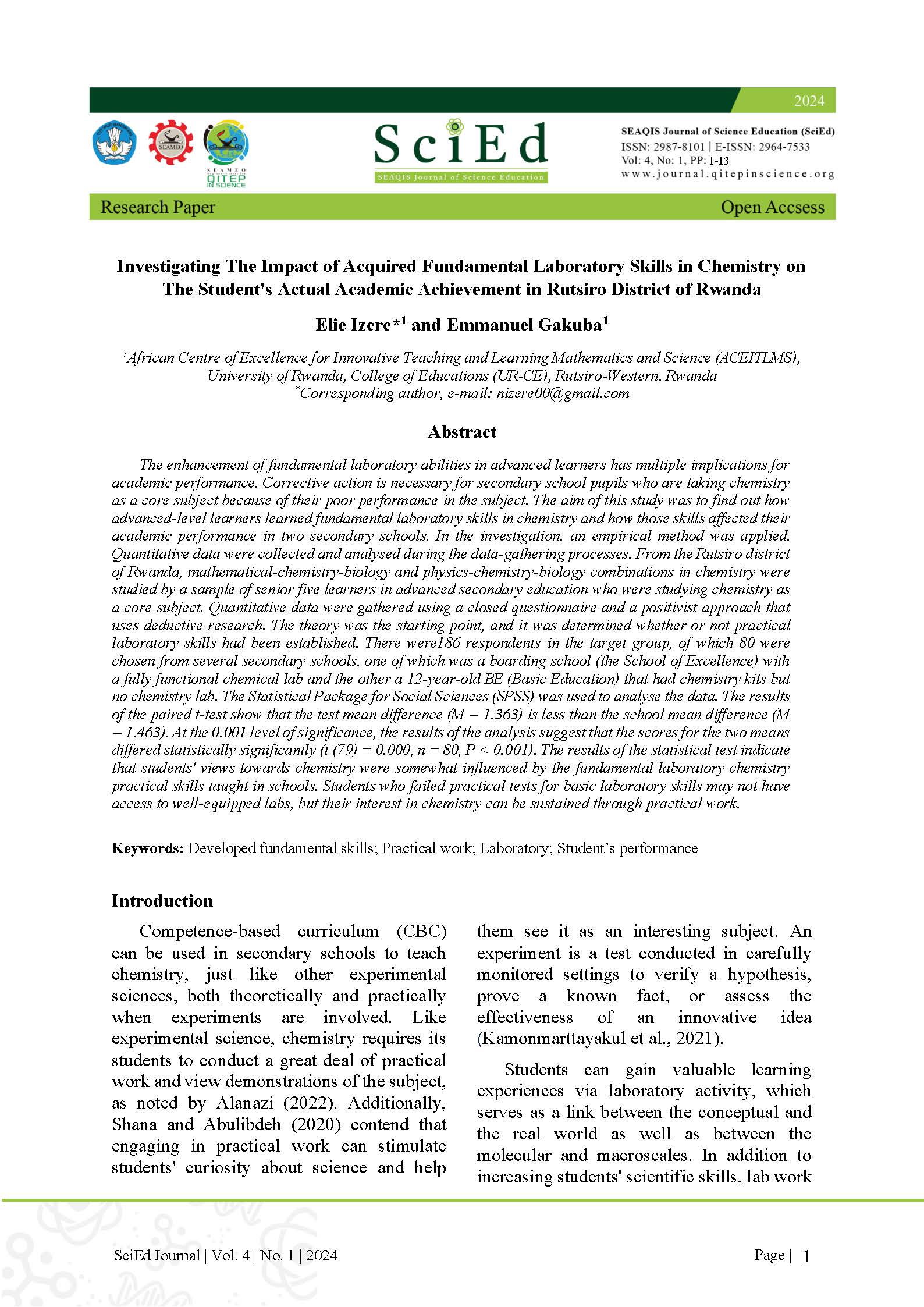Investigating The Impact of Acquired Fundamental Laboratory Skills in Chemistry on The Student's Actual Academic Achievement in Rutsiro District of Rwanda
DOI:
https://doi.org/10.58249/sjse.v4i1.135Keywords:
Developed basic skills, Practical work, Laboratory, Student’s performanceAbstract
The enhancement of fundamental laboratory abilities in advanced learners has multiple implications for academic performance. Corrective action is necessary for secondary school pupils who are taking chemistry as a core subject because of their poor performance in the subject. The aim of this study was to find out how advanced-level learners learned fundamental laboratory skills in chemistry and how those skills affected their academic performance in two secondary schools. In the investigation, an empirical method was applied. Quantitative data were collected and analysed during the data-gathering processes. From the Rutsiro district of Rwanda, mathematical-chemistry-biology and physics-chemistry-biology combinations in chemistry were studied by a sample of senior five learners in advanced secondary education who were studying chemistry as a core subject. Quantitative data were gathered using a closed questionnaire and a positivist approach that uses deductive research. The theory was the starting point, and it was determined whether or not practical laboratory skills had been established. There were186 respondents in the target group, of which 80 were chosen from several secondary schools, one of which was a boarding school (the School of Excellence) with a fully functional chemical lab and the other a 12-year-old BE (Basic Education) that had chemistry kits but no chemistry lab. The Statistical Package for Social Sciences (SPSS) was used to analyse the data. The results of the paired t-test show that the test mean difference (M = 1.363) is less than the school mean difference (M = 1.463). At the 0.001 level of significance, the results of the analysis suggest that the scores for the two means differed statistically significantly (t (79) = 0.000, n = 80, P < 0.001). The results of the statistical test indicate that students' views towards chemistry were somewhat influenced by the fundamental laboratory chemistry practical skills taught in schools. Students who failed practical tests for basic laboratory skills may not have access to well-equipped labs, but their interest in chemistry can be sustained through practical work.
References
Abdi, A. (2014). The Effect of Inquiry-based Learning Method on Students’ Academic Achievement in Science Course. Universal Journal of Educational Research,2(1), 37–41. https://doi.org/10.13189/ujer.2014.020104
Alanazi, F. (2022). Secondary school students’ awareness and practices of science practical work in Saudi Arabia. Cypriot Journal of Educational Sciences, 17(3), 840–858. https://doi.org/10.18844/cjes.v17i3.6886
Anwar, Y. A. S., Muti’ah, M., & Dewi, Y. K. (2023). An integrated laboratory work to improve students’ practical skills and attitudes toward biochemistry in the biochemistry course. Biochemistry and Molecular Biology Education, 52(1), 36–44. https://doi.org/10.1002/bmb.21787
Doreen, K., Njenga, G., & Irechukwu, N. (2023). Career Development and Employee Performance in Public Institutions in Rwanda: Case of Rwanda Housing Authority. Journal of Human Resource & Leadership, 7(2), 76–85. https://doi.org/10.53819/81018102t5199
Efe, A. H., & Abamba, E. I. (2023). Effects of Laboratory Method on Students’ Acquisition of Science Process Skills in Senior Secondary School Chemistry in Delta State, Nigeria. European Journal of Education Studies, 10(11). https://doi.org/10.46827/ejes.v10i11.5078
Ekici, F., & Atasoy, B. (2023). Implementation of Strategy Instruction to Promote Pre-Service Chemistry Teachers’ Self-Regulated Learning Skills. Shanlax International Journal of Education, 11(S1-Jan), 1–25. https://doi.org/10.34293/education.v11is1-jan.5863
Garminovich, N. (2020). Teaching students to solve problems in analytical geometry while studying mathematics. Trends in the Development of Science and Education. https://doi.org/10.18411/lj-11-2020-100
Iyamuremye, A., Mbonyubwabo, J. P., Mbonyiryivuze, A., Hagenimana, F., Butera, M., Niyonderera, P., & Ukobizaba, F. (2023). Enhancing Understanding of Challenging Chemistry and Physics Concepts in Secondary Schools of Kayonza District through Computer Simulation-Based Learning. Journal of Classroom Practices, 2(2), 1–28. https://doi.org/10.58197/prbl/thrf5883
Kamonmarttayakul, K., Boonyoung, N., & Phumdoung, S. (2021). Effectiveness of Modified Hybrid Brainstorming Learning Program in Increasing Innovative Work Behavior and Innovative Idea Performance among Nurses. Trends in Sciences, 18(22), 500. https://doi.org/10.48048/tis.2021.500
Kayitesi, A. M., Butera, E., & Mugenzi, L. (2022). Education and Careers Pathways in Rwanda (pp. 1-114). REB. https://www.unicef.org
Koller, H., Magne, O., & Marina, S. (2015). A Guidebook of Good Practice for the Pre-service Training of Chemistry Teachers (pp. 87-106). Faculty of Chemistry, Jagiellonian University in Krakow.
Mas’ud, A., Sundari, S., & Azahraa, I. F. (2022). Characteristics and Effectiveness of Blended Learning Through Reality Laboratory and Virtual Laboratory Activities in Genetics Course. Journal of Biology Learning, 4(1), 31. https://doi.org/10.32585/jbl.v4i1.2205
Miedema, S. (2023). Pandemic impact as worldview and paradigm clashes between science and society and between science and politics. Is there a role for pedagogy of science and worldview education? British Journal of Religious Education, 1–8. https://doi.org/10.1080/01416200.2023.2287987
MINEDUC/Ministry of Education (2018). Education Statistics, Kigali
MINEDUC/Ministry of Education (2020). Education Statistics, Kigali
Ndihokubwayo, K., Ukobizaba, F., & Byusa, E. (2022). Issues in subject combinations choice at advanced level secondary schools in Rwanda. Problems of Education in the 21st Century, 80 No.2 (1822-7864), 339-340. https://doi.org/10.333225
Okafor, N. (2021). Enhancing Science Process Skills Acquisition in Chemistry among Secondary School Students through Context-Based Learning. Science Education International, 32(4), 323–330. https://doi.org/10.33828/sei.v32.i4.7
REB, M. R. (2015). Curriculum framework from preprimary to upper secondary (1st ed., pp. 1-341).
Salin, R. (2022). Chemistry Lab Skills and Various Strategies for Developing Them. Cademix Institute of Technology.
Shana, Z., & Abulibdeh, E. S. (2020). Science practical work and its impact on students’ science achievement. Journal of Technology and Science Education, 10(2) (2014-5349), 199-215. https://doi.org/10.3926
Sokol, M., Rusyn, H., & Feketa, I. (2022, October 25). Features of Academic Integrity of Scientific‒Research Work of Students of Natural Specialties. Scientific Bulletin of Uzhhorod University. Series: «Pedagogy. Social Work», 2(51), 149–152. https://doi.org/10.24144/2524-0609.2022.51.149-152
Tahir, A. (2019). Effect of Chemistry Practicals on Student's Performance in Chemistry in Senior Secondary Schools In damaturu Local Government, Yobe State. African Scholar Publications & Research International, 15 NO.8 (2359-1991), 46-73.
Yuliani, G., Halimatul, H. S., Aisyah, S., & Widhiyanti, T. (2020). The Profile of Teachers' Performance in Designing Practical Chemistry Laboratory Works. Advances in Social Science, Education and Humanities Research, 438(AES 2019), 275–278. https://doi.org/10.2991/assehr.k.200513.062

Downloads
Published
Issue
Section
Citation Check
License
Copyright (c) 2024 SEAQIS Journal of Science Education

This work is licensed under a Creative Commons Attribution 4.0 International License.

This work is licensed under a Creative Commons Attribution 4.0 International License.














